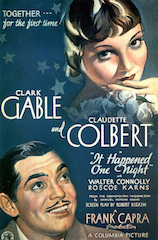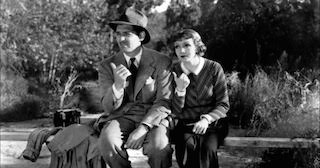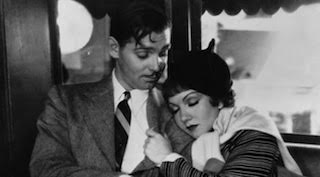 It’s common knowledge that most romantic comedies follow a formula. It’s not always a bad thing either. If you were to comb through film history to find the source of the rom-com formula, I would say undoubtedly that it comes from Frank Capra’s fabulous film, It Happened One Night. This film is THE definitive romantic comedy and ranks number one on my personal Top Five List of Romantic Comedies.
It’s common knowledge that most romantic comedies follow a formula. It’s not always a bad thing either. If you were to comb through film history to find the source of the rom-com formula, I would say undoubtedly that it comes from Frank Capra’s fabulous film, It Happened One Night. This film is THE definitive romantic comedy and ranks number one on my personal Top Five List of Romantic Comedies.
Typically, the first step in the formula is showing the audience two very different people living a day in their lives. We meet Ellen “Ellie” Andrews –a spoiled daddy’s girl in her early twenties – currently throwing a tantrum about her runaway marriage to a man she hardly knows. Ellie comes from money and is used to having it be more than the mere currency in her life. It’s pretty obvious Ellie married this man, King Westley, as a means of rebelling against her loving, but often preoccupied, father. She runs away from him (or more accurately swims away), and sets out on a road trip back to New York from their yacht in Florida.
Just after Ellie’s debut, we meet Peter Warne. He’s a ballsy, smart aleck reporter who in the first scene is arguing with his boss with a full audience listening in from outside the phone booth. He gets fired over the phone and boards a bus back to New York. It’s very likely he means to beg for his job back, but he’d be too proud to admit so.
It is on this fateful bus trip that Ellie and Peter meet. Right away their personalities contrast and rub against each other, sparking like flint as they argue over seating. Ellie is traveling undercover, but since she’s a known society sweetheart Peter has her figured out instantly. She begs him not to inform on her and tell her father and promises that if he can help her get to New York she’ll give him her story for the newspaper and, of course, money.
What really separates this film from other romantic comedies is Peter Warne as a character and his protection of Ellie. He knows he needs to keep her in his sights until the headline is officially his. He plays off their relationship as husband and wife to throw off the scent from suspicious travelers they meet on their journey. This, of course, brings the awkwardness of a sleeping arrangement when their bus is forced to stop at lodging during a storm.
Peter makes a blanket wall between their two beds calling it “the walls of Jericho.” He basically implies with a little humor that he will keep this barrier between them and not make any inappropriate advances on her or compromise her honor in any way. He thoroughly enjoys teasing her about it, but he’s also completely sincere. When she’s with him, she is safe. There’s a point where she unwittingly drapes her undergarments on the barrier without thinking. He says to her in quite a serious tone, “I wish you’d take those things off the walls of Jericho…” It gives us a hint that Peter also makes it a point to protect himself from temptation.
Due to her overly indulged and pampered upbringing, Ellie has little common sense in the real world. Though she’s “over 21,” as she boldly announces in the first scene, she knows next to nothing about how to make it on her own. Peter is acutely aware of this. He can be grumpy or agitated with Ellie’s naivety, and his protective nature toward her can come off as controlling sometimes, but it’s clear he has her best interests at heart. When examined closely, there is truly no chauvinist agenda here. Even when Peter “spanks” Ellie it is a playful moment, not a hurtful one. There are times when it seems Peter values her even more than she values herself. While she’s willing to gold dig for a meal or flash a little leg to get a car to pull over, he is offended by those gestures. He is not a misogynist who wants to reel her in, he is genuinely concerned for her welfare. Peter knows the world, so he knows that many people really could mean her harm, and it’s not something to be taken lightly.
He makes sure all her needs are met on their journey. He clothes her when she’s cold, finds food for her when she’s hungry, even gets her clothes pressed for her. He also keeps her at a distance from several shifty characters. This caring nature is something maybe even he didn’t know he had until Ellie came into his life. It’s not that Ellie truly is helpless, she’s just accustomed to dependency on others, as well as apathy toward her own inexperience. Thus, her decisions are often impractical and rash. Her time with Peter opens her eyes to an independence she’s always craved, but never fully comprehended in a practical way until now.
 It is clear that Ellie and Peter are absolutely perfect for each other. Their differences are wonderfully complimentary, and their similarities are comical and fun. They both have a sort of carefree madness that comes out when they are together. They come alive.
It is clear that Ellie and Peter are absolutely perfect for each other. Their differences are wonderfully complimentary, and their similarities are comical and fun. They both have a sort of carefree madness that comes out when they are together. They come alive.
They are also both closet romantics. Ellie asks Peter if he’s ever been in love. He delves into his fantasy of adventuring with someone for the rest of his life. Peter is a man of experience, and it is something Ellie truly admires. He desires to get the most out of life, and she does too. As Peter explains his romantic plans for his future, she realizes she wants to be the one adventuring by his side.
Peter rejects her when she tells him she wants to be with him. He loves her, but she’s technically married to King Westley. It is painful for both of them, but at this point it seems nothing can be done.
We now come to the climactic story beat of the romantic comedy. This is the point where it seems all hope is lost and each character does something stupid to the other unintentionally because of a misunderstanding. The misunderstanding is usually something that could have easily been avoided by communication, but then, of course, there would be no story. Despite that common narrative flaw of keeping your characters from exerting common sense simply to create drama, this film ends on an exhilarating note. If you’ve already seen it, then you know what I mean, but if you haven’t, I strongly encourage adding this to your viewing queue. Not only is the film hilarious and enjoyable, it’s also a subtle commentary that is perhaps more meaningful today than it was at the time of its release.


1 comment